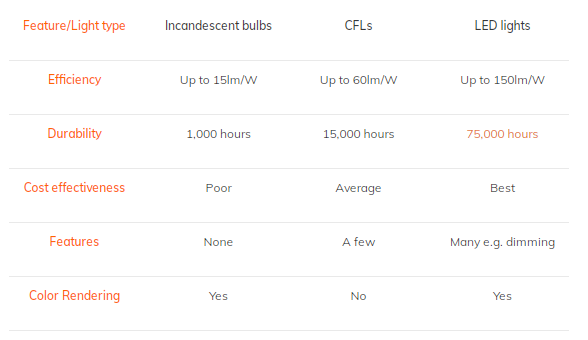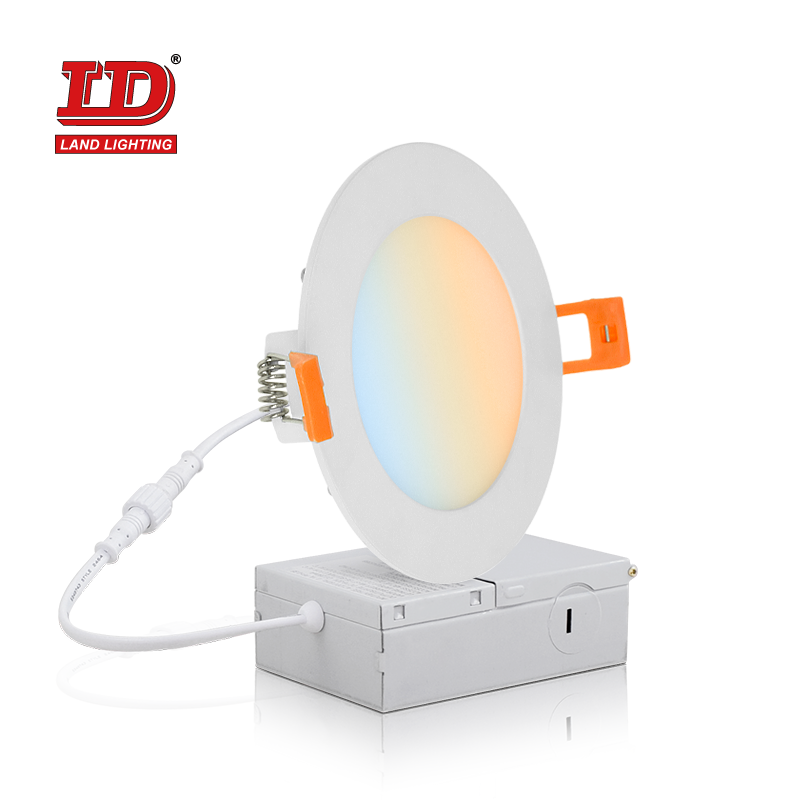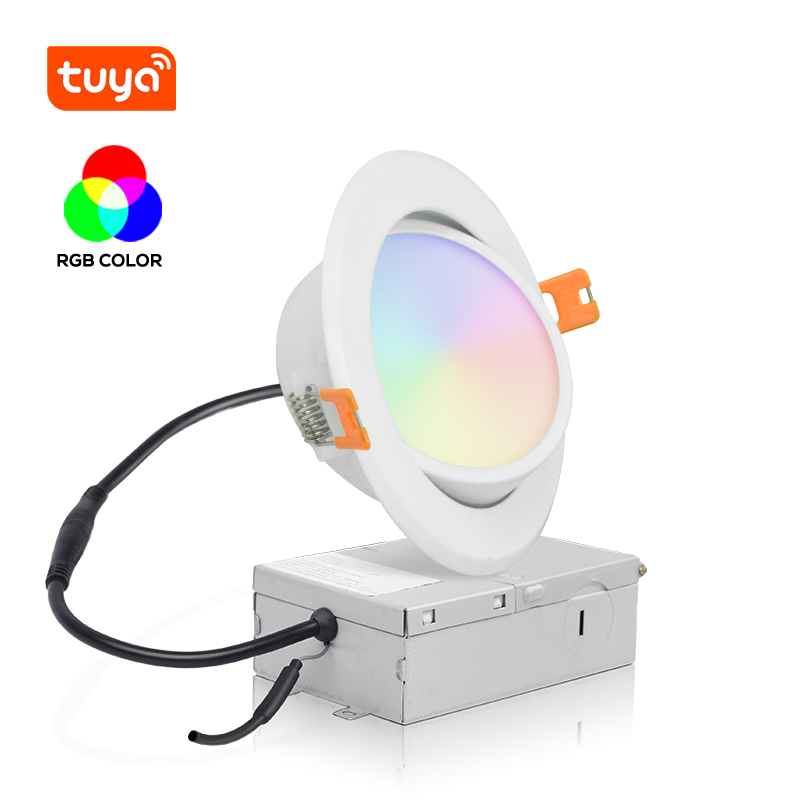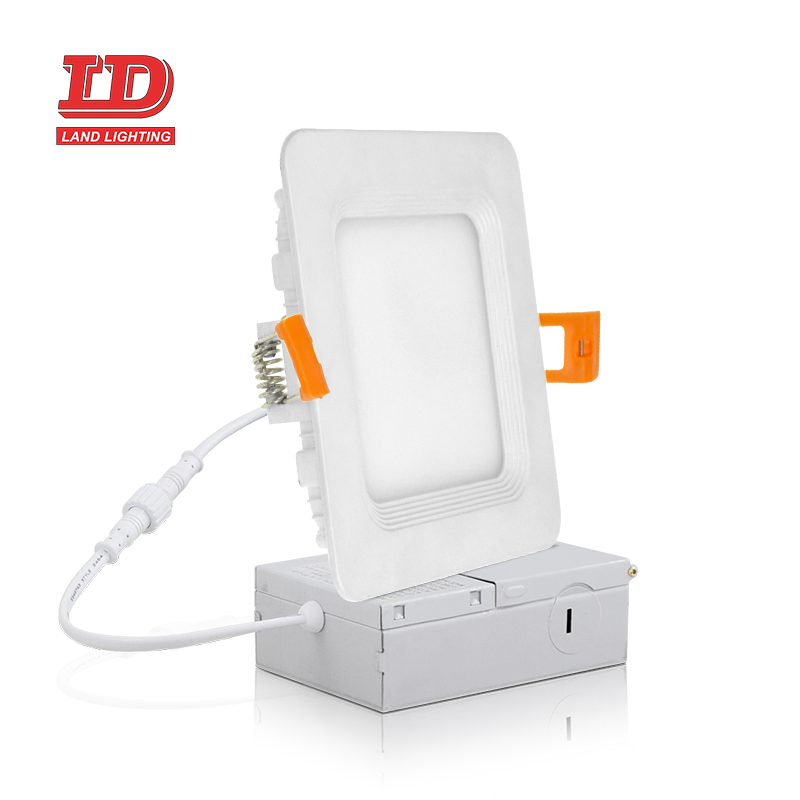What are the Differences Between Incandescent Light Bulbs and LED Fixtures?
l LEDs use semiconductors that glow when exposed to voltage and that’s why they don’t heat up as compared to Incandescent bulbs that use filaments.
l LED fixtures are up to 80% more efficient than Incandescent lights. That means that you can cut down your lighting expenses by a very large margin.
l LED lights last longer. Typically, LED fixtures can last up to 70,000 hours; which is 70 times longer than standard incandescent bulbs.
l Also, LED fixtures allow for features like dimming and color manipulation; you won’t get these in an incandescent fixture.
l Incandescent bulbs are the cheapest in the lighting market. However, they don’t last long and are expensive to operate. LEDs are quite the opposite. They last longer cost very little to operate and maintain but are fairly expensive too.
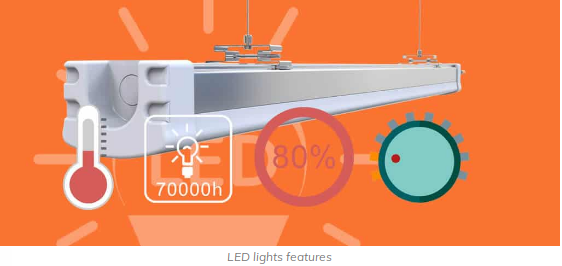
Incandescent Bulbs vs. CFLs vs. LEDs
Understanding the difference between these lighting technologies is the easiest way to see why the incandescent ban is necessary.
Before LEDs came into the picture, CFLs (or Compact Fluorescent Lights) were the best alternative to using incandescent lights.
And that’s why these three are so popular.
Now:
To better understand their differences, a few comparisons have to be made.
In most of the 20th Century, incandescent lights were the best and most popular lighting technology available.
They were simple, affordable, readily available, and very easy to use.
Sadly, there wasn’t much improvement in terms of efficiency, durability, and features with time.
And that’s why it grew less popular as more and more efficient lighting technologies kept popping up.
Pros:
Very affordable.
Instant switching except for halogen bulbs.
Easy to use
Cons:
Very inefficient.
Short lifespans.
Not eco-friendly.
Limited features.
Heating problems.
High cost of operation.candescent Lights Overview
Compact Fluorescent Light (CFL) Overview
By the end of the 20th century, CFLs had gained popularity because they were the first, best alternative to incandescent lights at the time.
In fact, they were dubbed “Energy savers” on account of the fact that they used less energy to produce the same amount of lighting as an incandescent bulb.
The thing with CFLs is that they weren’t perfect.
Yes, they made up for most of the downsides of using incandescent lights.
But:
That wasn’t enough!
And when LEDs came into the picture, things changed for the better.
Pros:
They are more than four times more efficient than incandescent bulbs. For example, one 100-Watt incandescent light is equal to at least four 25-Watt CFLs.
CFLs were cheaper to use than incandescent lights despite their high initial cost.
CFLs don’t have a carbon footprint therefore, they help to reduce carbon emissions.
They are highly applicable and come in many different designs.
CFLs last up to five times longer than incandescent bulbs.
Cons:
Switching them on/off reduces their lifespan. Not suitable for places where light is needed frequently but over short periods.
Are not necessarily dimmable.
They are not eco-friendly since they contain toxic substances like mercury that can be harmful to human health.
They easily get damaged. The tubes are often too weak.
LED Lights Overview
LED lights happen to be the best lighting technology in existence today.
That’s because it makes up for almost all the shortcomings of all other technologies.
And that’s why a lot of governments have been encouraging their citizens to switch to LEDs in order to enjoy better and cheaper lighting.
Now:
The list of perks that comes with using LEDs is endless.
And despite the fact that LEDs are expensive, the convenience and benefits that come with them are always worth it.
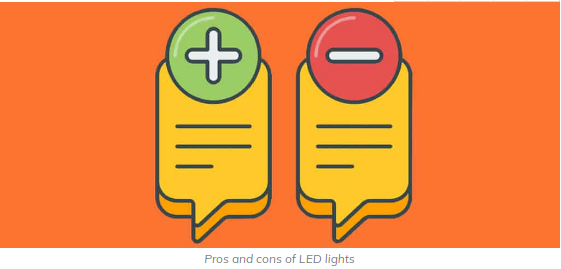
Pros:
LED lights are over 80% more efficient than incandescent bulbs.
With LEDs, you don’t have to worry about durability since they last up to 100 times longer than incandescent lights.
LEDs can cut down lighting costs by up to 80%.
Since they are “Solid State Lighting,” LEDs don’t easily break or get damaged.
LEDs don’t heat up and are not affected by cold temperatures.
Instant switching.
They have excellent color rendering.
Are dimmable.
LEDs don’t contain toxic materials and are therefore eco-friendly.
Cons:
They are fairly expensive. But the price keeps going down as the supply increases.
Blue hazard exposure risks.
From this, it’s obvious why LEDs are the best replacement for incandescent lighting.
But, to make it even easier, here’s a short table of comparison:
